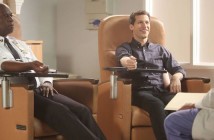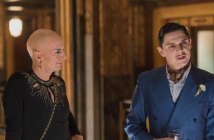Masters of Sex, Season 2, Episode 9, “Story of My Life”
September 7, 2014 10:00 p.m. (EST), Showtime
We spend so much of our lives hiding ourselves. Not just little things, like tiny indignities that pockmark our days or minor thoughts that throw off our mood. We hide big things. We hide the things that drive us, the things that hurt us or help us to cope with the pain. We hide our pasts, we hide our presents. We hope if we hide well enough, we may even be able to change our futures. We hide ourselves, and deep down we’re torn: We want someone to find us. We want to stay hidden forever. We want. And sometimes, that’s the hardest thing of all.
“Story of My Life” is really, in effect, a story of three monologues, in which characters reveal themselves whether they intend to or not, in which they dig into their secret shames and come up finding more of themselves than they expected. Masters of Sex is at its best when it is a long, measured character study, and it also tends to do well when it leans into the theatrical (like in these monologues, or in “Fight,” which could easily be staged as a one act play). As we see Virginia engage in therapy that is about Barbara until its about her, as we watch Frank dig into his past at alcoholics anonymous, as we watch Barbara come face to face with darker truths than she was prepared for due to Virginia’s lack of training as a therapist, the show shines, because these characters shine. They become, for a brief few moments, something more than just players on a stage. They become people laid bare. It’s what this show can do at its best, and what it has done all too rarely this season.
The idea of Virginia going to therapy for Barbara was a really terrible one. Fortunately, the show seems to have realized this immediately, and so Virginia’s trips are not just ineffective, but in fact slowly begin to be less about Barbara than about her own lingering sexual guilt—her shame about her affair with Bill. What Virginia comes across, hidden deep in herself, is a deep fear that she is doing something wrong, that she has been doing something wrong for years, and that she is continuing to do it, even as she knows it is wrong, even as she knows she should stop. Lizzie Caplan is phenomenal in those scenes, perfectly modulating the stilted tale of Barbara’s, then flowing into a more natural speech pattern when she begins to talk about herself. It’s stellar work here, a reminder (as if one was needed) of the asset the show has at its center.
Frank’s Alcoholics Anonymous monologue is the most nakedly theatrical moment in the episode, to the point that it nearly took me out of things. Christian Borle can be too mannered a performer at times, but he turns the monologue into a tour de force by embracing the theatricality, by making his performance the center of the story. It’s a nifty trick, pulled off with the help of some great writing. That beat, when Bill disappears at the end of a monologue about the Masters boys disappearing, could be too cute, but Borle’s devastation makes it land.
Barbara’s storyline has quickly become the sort of thing you bring an actress of Betsy Brand’s caliber in to handle, as she becomes the test case for the study’s efforts to treat sexual dysfunction, and proves that the psychological component is just as vital as the physical. It’s a hard lesson to learn, but there’s some things a speculum just can’t fix. Virginia tries to ape the therapist and convince Barbara to role-play a conversation with her brother, but Barbara’s brother lives 20 miles away, so she takes initiative and just goes to talk to him in person. There, she learns that it was quite possibly her that made the advances, her that suggested she and her brother have sex. Barbara is experiencing great, traumatic pain, and Bill and Virginia have to learn, slowly but surely, that they can’t just treat it physically.
Not all of “Story of My Life” works, of course. There’s still Libby’s Adventures in Racism, the subplot that just refuses to die gracefully or find something to say about Libby, racism, or eyewitness identification. This week, Libby confronts her own inability to lie, and the sort of ways in which the sort of person she is fail to live up to her own ideals. If this plotline had been handled effectively to this point, everything in this episode might actually have landed. The scene where Robert tries to coach Libby’s testimony and ends up cross-examining her would be interesting if it didn’t feel so hollow. There’s no weight to anything in this plotline because, despite its season long build-up, it has never managed to make me care about what is happening or what it means for the characters. Masters of Sex had two plotlines about the black experience in mid-twentieth century America earlier this season; it chose to abandon the better one in favor of something that feels unlikely to ever cohere. And this season has been the worst for it.
The final scene between Bill and Virginia lets them both lay their cards on the table in a way they haven’t since “Fight,” and the brutal honesty is invigorating and fascinating. Virginia admits the two are having an affair and hurting Libby; Bill admits his impotence, even if he does so at least partially to lure Virginia into staying with him. Frank tells Bill earlier in the episode that the truth will set him free. It’s a simple moral, the kind we’ve all heard before, but one that is tough to internalize when it really matters. There’s comfort in the dark. It’s safe where no one can see you. The problems may just go away if you bury them deep enough, if you run fast enough, if you hide well enough. But what will you lose of yourself along the way? What will slip away while you cower in the dark? Your wants will never disappear, not really. All that might fade away is your chance to get what you want. It’s safe in that dark room, but it’s empty, too. And no one will come along to fill it if you never open the door.
The Roundup
- Apologies for the delay here. My computer crashed, and that made writing this one on time pretty much impossible.
- “What did the winner have that you didn’t?” “An uncanny resemblance to Veronica Lake?”
- “Does that happen a lot? From her to me…or from me to her? Never mind.”
- “Couldn’t it be a holiday? Doesn’t it sound like a holiday? The feast of vaginismus!”
- “I’m trying to remember the last time something I said mattered this much.”
- “He taught both of his boys to vanish, didn’t he Bill?”
- “Who did you really think you were in that story Bill? Me, or him? Think about it.” “There’s nothing to think about.” “He left you. And you left me.”
- “What do you tell yourself, Bill, that makes all of this ok?”
“Story of My Life” is really, in effect, a story of three monologues, in which characters reveal themselves whether they intend to or not, in which they dig into their secret shames and come up finding more of themselves than they expected.
-
GOOD




